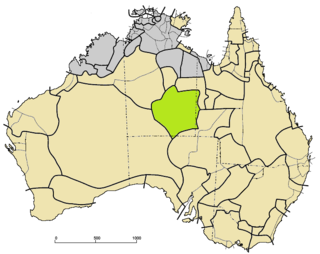It has been suggested that this article should be split into articles titled Anmatyerr language, Western Arrarnta language, Alyawarra language and Ayerrerenge language. (discuss) (November 2024) |
| Upper Arrernte | |
|---|---|
| Arrernte | |
| Pronunciation | [aɾəⁿɖə] |
| Native to | Australia |
| Region | Northern Territory |
| Ethnicity | Arrernte people, Alyawarre, Anmatyerre, Ayerrereng, Yuruwinga |
Native speakers | 4,100 (2021 census)[1] |
Pama–Nyungan
| |
| Latin | |
| Arrernte Sign Language | |
| Language codes | |
| ISO 639-3 | Variously:amx – Anmatjirraaly – Alyawarradg – Antekerrepenheaer – Eastern Arrernteare – Western Arrernteaxe – Ayerrerenge |
| Glottolog | aran1263 |
| AIATSIS[2] | C8 Arrernte, C14 Alyawarr, C8.1 Anmatyerre, C12 Antekerrepenh, G12 Ayerrerenge, C28 Akarre |
| ELP | |
 Map of where Arandic is spoken | |
 Arrernte is classified as Vulnerable by the UNESCO Atlas of the World's Languages in Danger | |
Arrernte or Aranda (/ˈʌrəndə/;[3] Eastern Arrernte pronunciation: [aɾəⁿɖə]), or sometimes referred to as Upper Arrernte (Upper Aranda), is a dialect cluster in the Arandic language group spoken in parts of the Northern Territory, Australia, by the Arrernte people. Other spelling variations are Arunta or Arrarnta, and all of the dialects have multiple other names.
There are about 1,800 speakers of Eastern/Central Arrernte, making this dialect one of the widest spoken of any Indigenous language in Australia, the one usually referred to as Arrernte and the one described in detail below. It is spoken in the Alice Springs area and taught in schools and universities, heard in media and used in local government.
The second biggest dialect in the group is Alyawarre. Some of the other dialects are spoken by very few people, leading to efforts to revive their usage; others are now completely extinct.
- ^ Australian Bureau of Statistics (2021). "Cultural diversity: Census". Retrieved 13 October 2022.
- ^ C8 Arrernte at the Australian Indigenous Languages Database, Australian Institute of Aboriginal and Torres Strait Islander Studies (see the info box for additional links)
- ^ Laurie Bauer, 2007, The Linguistics Student's Handbook, Edinburgh; also /əˈrændə/ "Aranda". Oxford English Dictionary (Online ed.). Oxford University Press. (Subscription or participating institution membership required.)